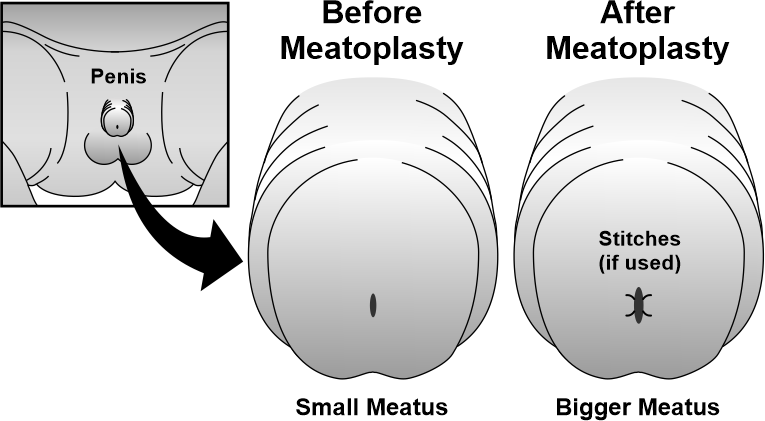Meatoplasty/Meatotomy
What is a meatoplasty?
The opening at the tip of the penis is called the urethral meatus (mee-AY-tis). Sometimes this opening is too small (meatal stenosis), making it difficult to pass urine (pee). This may change the appearance or pressure of the urine stream during urination. A meatoplasty (also called meatotomy) is a surgical procedure to make the opening at the tip of the penis larger to allow urine to pass freely.
What causes meatal stenosis?
Prior circumcision or surgery on the penis. Irritation, inflammation or injury to the meatus.
How is it diagnosed?
Your doctor will ask questions about symptoms and do a physical examination.
When is surgery needed?
Your child's Urologist may recommend the procedure to help with current symptoms and to prevent ongoing problems. The procedure can be scheduled at a time that works for your family.
What happens during surgery?
Your child will receive a general anesthetic to help them sleep and not feel pain during surgery. A numbing cream will also be applied to the penis. The tissue that is blocking the urethral meatus will be removed or cut. Small dissolvable stitches or surgical glue will be placed. The goal is to help your child pee more efficiently, comfortably, and improve the urine stream.
Will my child be in pain?
Most children do well with the surgery. If your child is in pain, a pain medicine can help. You may alternate Acetaminophen (Tylenol® or another brand) and Ibuprofen (such as Advil® or Motrin®). Do not give aspirin because it may cause bleeding.
What can I expect after the surgery?

Before your child is discharged you will be given written information about care at home and any questions you have will be answered.
- Diet: Resume regular diet as tolerated.
- Activity: Your child may return to school or daycare when pain is well controlled. Avoid straddling activities, contact sports and swimming for 7 days or until completely healed.
- Wound care:After the surgery, the tissue may swell or form small scabs at the meatus. This may cause temporary spraying or splitting of the urine stream and should resolve within 1-2 weeks of surgery. As time goes on, the swelling will improve and if used, the stitches or surgical glue will dissolve.
- Your child may feel stinging or burning the first few times they pee which usually goes away within the first 24 hours.
- Your doctor may order an anesthetic (numbing) cream to apply 10-15 minutes prior to peeing if burning or stinging while peeing becomes problematic.
- Apply Aquaphor® or Vaseline® at least 4 times a day before and after peeing to prevent urine from irritating the area.
- Keep your child well hydrated and encourage a potty-trained boy to empty the bladder every 2-3 hours.
- Consider wearing loose fitting underwear. If your child is in diapers, change frequently and consider going without a diaper for periods throughout the day.
- Avoid constipation.
- Bathing: It is ok to take a bath 24 hours after procedure. Bathe (5-10 minutes) in plain water for the next 7 days. A daily warm bath will help with healing and provide comfort.
Medicines
Most children do well with surgery.
- You may alternate Acetaminophen (Tylenol® or another brand) and Ibuprofen (such as Advil® or Motrin®). Do not give aspirin because it may cause bleeding.
- Apply Aquaphor® or Vaseline® to tip of penis 4 times a day. If your doctor prescribes an anesthetic (numbing) cream, apply to the tip of the penis as needed.
What to call the doctor for:
- Fever with worsening redness or drainage at surgical area
- Significant swelling, bruising or bleeding at surgical area
- If the wound starts separating
- Decreased urine output or decrease in wet diapers
Follow-up care:
Follow-up with your child’s surgeon as directed following the surgery. Call your surgeon’s office to schedule an appointment.
Questions?
This information is not specific to your child but provides general information. If you have any questions, please call us at 612-813-8000.
This page is not specific to your child, but provides general information on the topic above. If you have any questions, please call your clinic. For more reading material about this and other health topics, please call or visit Children's Minnesota Family Resource Center library, or visit www.childrensmn.org/educationmaterials.
© 2024 Children's Minnesota
